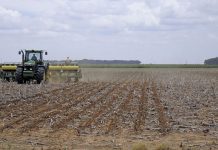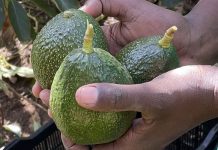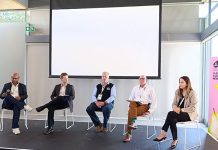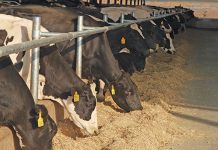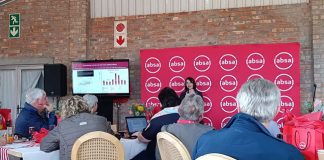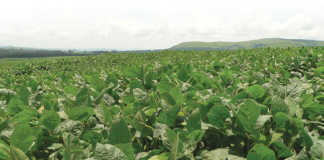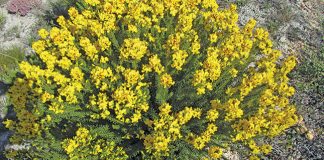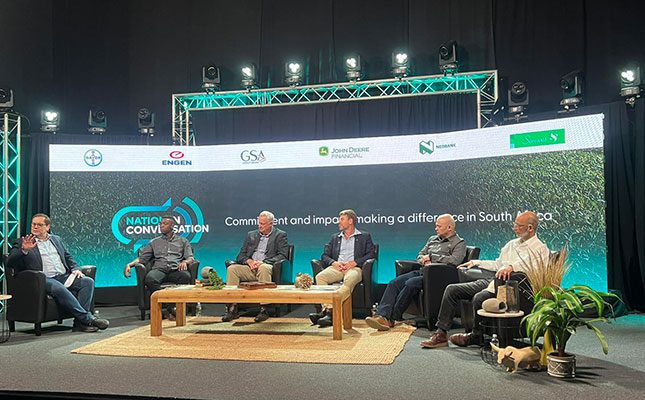
Photo: Agbiz
The Nation in Conversation discussion was facilitated by Theo Vorster, CEO of Galileo Capital. Panel members included Desry Lesele, senior manager of Client Value Proposition at Nedbank Agriculture; Francois Strydom, group CEO of SENWES; Kobus Meintjes, Bayer country commercial lead South Africa; Stephan Gouws, managing director John Deere Africa and Middle East; and Adnaan Emeran, Engen’s marketing and business development manager for Commercial Fuels and Lubricants.
All the panellists agreed that one small action or initiative will almost always act as a flywheel that will convert that small action into something big.
READ Seven secrets of success for small farmers
The panel discussed the role and impact of investment in agricultural development and explored the impact that these investments, be it time, training, equipment, knowledge, or money, can have in rural South Africa.
From empowering smallholder farmers to fostering sustainable development, the panellists shared their perspectives on the aims, objectives, and impact of development and upliftment programmes.
According to Strydom, individuals and companies operating in an area play a crucial role in supporting agricultural and other community initiatives. He stressed that these programmes and activities were indispensable for driving positive change in the country.
He referred to the upcoming elections and said that the election in itself was not the most important factor, but rather the actions that would follow the election.
“What happens to our country after the election is what will determine if we are successful as a country or not. Will there be wealth creation and will the outcome lead to upliftment. That is important,” he said.
Strydom also pointed out that it served no purpose to manage the consequences of certain actions, but that it was more important to change the circumstances. “Do something meaningful that will create change and provide hope.”
He further pointed out that it was important for companies and farmers to protect their investments.
“We live and work in a specific space and we have the responsibility to protect the people and your business interests. And we do this by being involved in our communities and partnering with other businesses and the community to create change.”
Strydom also stressed the importance of investing in schools on farms so that the children of the community did not have to travel far to get to school.
“[It] is important to revive farm schools. Not only from a parenting point of view, or from an education point of view, but from community and societal point of view as well. It is at school where you teach children about good governance. By providing sport facilities you develop balanced children. A balanced kid is always better equipped to handle change and challenges.”
Strydom further pointed out that the work that farmers were doing in their communities was under-estimated.
READ How aquaponics is being used to feed communities
“Farmers are doing way more than what they should and what we give them credit for. It is farmers with the support of the agriculture sector that keep up the infrastructure in their communities, supporting schools, churches, and old age homes, as well as road and water maintenance.”
Gouws agreed and said that within the John Deere family, dealers were involved in many projects in their local communities with the support of the company.
“We know that the support provided by our dealer network in the rural communities is directing chance and creating hope.
“We sometimes believe that we have to have big goals and plans before it will be meaningful. But this is not true. At John Deere we have seen that very often one small action can make a huge impact. A small contribution can make a big difference.”
The panel discussed the role of partnerships in these actions and stressed it was important to tackle challenges by partnering with like-minded people and businesses. “It will have a greater impact if projects are done in partnership because partnerships will ensure better sustainability of projects.
Lesele explained that Nedbank was looking at project funding in two ways.
“We look at partnerships when investing in projects. We want you, the business, or the farmer, to be able to fulfil your purpose and projects to be sustainable.”
According to Emeran, communities must not abdicate their responsibilities. “We have not choice to accept co-responsibility. Unless we address the issues, we are heading for disaster. We are all in the same boat – if there is a leak it will affect everyone. We need to fix the leaks in our communities so that we can thrive,” he said.
Meintjes agreed and added that Bayer was investing in rural schools with the aim of creating an environment where young people feel at home and can develop.
“We are passionate about young people. They are the future. In partnerships we wish to create spaces for them to grow and learn and bring back their knowledge into the agriculture sector. We need good people to come back to rural communities and the agriculture sector.”
“Agriculture is not only about tilling the soil, but it is about creating value and opportunities across the value chain,” Strydom agreed.
“If the rural communities are not doing well, our farmers will not do well,” Meintjes concluded.


